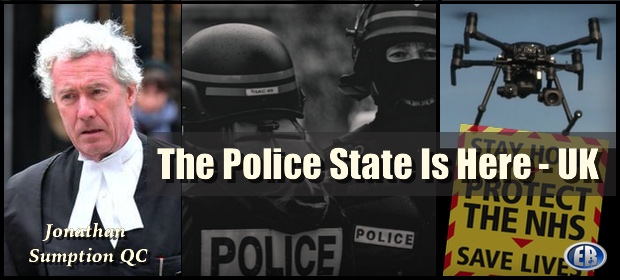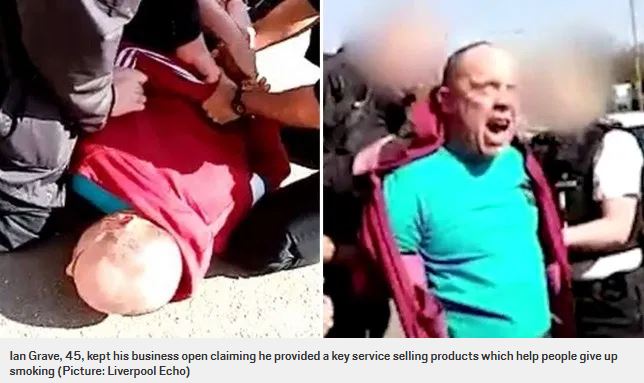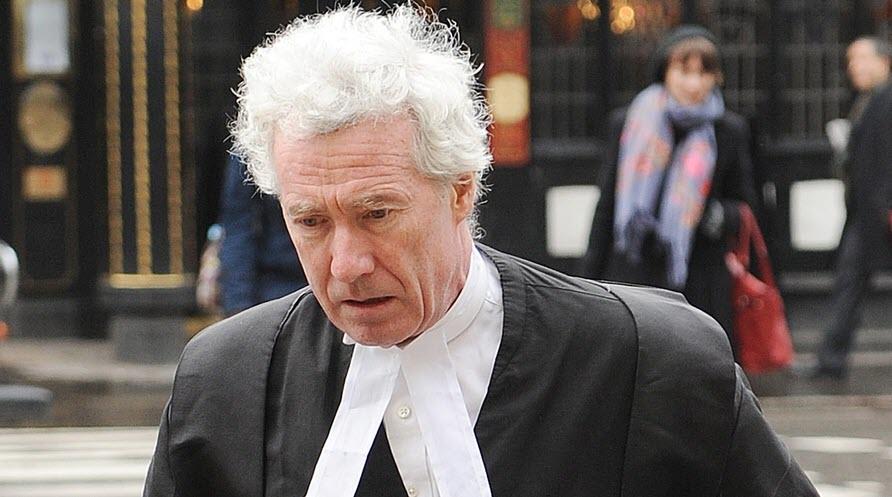
ER Editor: The theme here is the police state, with a useful interview from March 30 in The Spectator with Lord Jonathan Sumption, a former UK Supreme Court justice, who gives his opinion on the police state that has suddenly transpired. Below that, we offer a segment dated April 2 from a new blog titled Policing the Corona State, which keeps a daily diary on what people are experiencing in this new lockdown state, especially remarking police overreach.
Referred to by Lord Sumption below, Derbyshire police have been the worst culprits of overreach, enforcing good behaviour, not the law, with shaming drone footage of people taking a walk in its hilly regions being posted online. See Derbyshire police criticised for drone footage as force told ‘be consistent’ with lockdown guidelines from March 31. Here is their infamous Twitter post:

********
Former British Supreme Court Justice: “This Is What A Police-State Is Like”
Via The Spectator
The former Supreme Court Justice Jonathan Sumption, QC, has denounced the police response to the coronavirus, saying the country is suffering ‘collective hysteria’.
This is an edited transcript of his interview with BBC Radio 4’s World at One programme earlier today.
BBC interviewer Jonny Dymond
‘A hysterical slide into a police state. A shameful police force intruding with scant regard to common sense or tradition. An irrational overreaction driven by fear.‘ These are not the accusations of wild-eyed campaigners, they come from the lips of one our most eminent jurists Lord Sumption, former Justice of the Supreme Court. I spoke to him just before we came on air.
Lord Sumption
The real problem is that when human societies lose their freedom, it’s not usually because tyrants have taken it away. It’s usually because people willingly surrender their freedom in return for protection against some external threat. And the threat is usually a real threat but usually exaggerated. That’s what I fear we are seeing now. The pressure on politicians has come from the public. They want action. They don’t pause to ask whether the action will work. They don’t ask themselves whether the cost will be worth paying.
They want action anyway. And anyone who has studied history will recognise here the classic symptoms of collective hysteria. Hysteria is infectious. We are working ourselves up into a lather in which we exaggerate the threat and stop asking ourselves whether the cure may be worse than the disease.
Dymond
At a time like this, as you acknowledge, citizens do look to the state for protection, for assistance, we shouldn’t be surprised then if the state takes on new powers if it responds. That is what it has been asked to do, almost demanded of it.
Sumption
Yes, that is absolutely true. We should not be surprised. But we have to recognise that this is how societies become despotisms. And we also have to recognise this is a process which leads naturally to exaggeration. The symptoms of coronavirus are clearly serious for those with other significant medical conditions, especially if they’re old. There are exceptional cases in which young people have been struck down, which have had a lot of publicity, but the numbers are pretty small. The Italian evidence, for instance, suggests that only in 12 per cent of deaths is it possible to say coronavirus was the main cause of death. So yes this is serious and yes it’s understandable that people cry out to the government.
But the real question is: is this serious enough to warrant putting most of our population into house imprisonment, wrecking our economy for an indefinite period, destroying businesses that honest and hardworking people have taken years to build up, saddling future generations with debt, depression, stress, heart attacks, suicides and unbelievable distress inflicted on millions of people who are not especially vulnerable and will suffer only mild symptoms or none at all, like the Health Secretary and the Prime Minister*.
*ER: we need to add here that Boris Johnson was moved into ICU yesterday, April 6.
Dymond
The executive, the government, is all of a sudden really rather powerful and really rather unscrutinised. Parliament is in recess, it’s due to come back in late April, we’re not quite sure whether it will or not, the Prime Minister is closeted away, communicating via his phone, there is not a lot in the way of scrutiny is there?
Sumption
No. Certainly, there’s not a lot in the way of institutional scrutiny. The press has engaged in a fair amount of scrutiny, there has been some good and challenging journalism. But mostly the press has, I think, echoed and indeed amplified the general panic.
Dymond
The restrictions in movement have also changed the relationship between the police and those whose, in name, they serve. The police are naming and shaming citizens for travelling at what they see as the wrong time or driving to the wrong place. Does that set alarm bells ringing for you, as a former senior member of the judiciary?
Sumption
Well, I have to say, it does. I mean, the tradition of policing in this country is that policemen are citizens in uniform. They are not members of a disciplined hierarchy operating just at the government’s command. Yet in some parts of the country, the police have been trying to stop people from doing things like travelling to take exercise in the open country, which are not contrary to the regulations, simply because ministers have said that they would prefer us not to. The police have no power to enforce ministers’ preferences, but only legal regulations – which don’t go
anything like as far as the government’s guidance. I have to say that the behaviour of the Derbyshire police in trying to shame people into using their undoubted right to take exercise in the country and wrecking beauty spots in the Fells so that people don’t want to go there, is frankly disgraceful.
This is what a police state is like. It’s a state in which the government can issue orders or express preferences with no legal authority and the police will enforce ministers’ wishes. I have to say that most police forces have behaved in a thoroughly sensible and moderate fashion. Derbyshire police have shamed our policing traditions. There is a natural tendency of course, and a strong temptation for the police to lose sight of their real functions and turn themselves from citizens in uniform into glorified school prefects. I think it’s really sad that the Derbyshire police have failed to resist that.
Dymond
There will be people listening who admire your legal wisdom but will also say ‘well, he’s not an epidemiologist, he doesn’t know how disease spreads, he doesn’t understand the risks to the health service if this thing gets out of control’. What do you say to them?
Sumption
What I say to them is I am not a scientist but it is the right and duty of every citizen to look and see what the scientists have said and to analyse it for themselves and to draw common sense conclusions. We are all perfectly capable of doing that and there’s no particular reason why the scientific nature of the problem should mean we have to resign our liberty into the hands of scientists. We all have critical faculties and it’s rather important, in a moment of national panic, that we should maintain them.
Dymond
Lord Sumption, former Justice of the Supreme Court, speaking to me earlier. We put his criticism of Derbyshire police to the force and they sent us this statement: ‘Our advice to the public was in line with national government instruction and echoed what people in our communities were saying following thousands of people that travelled to the Peak District National Park the previous weekend. The weekend just gone saw much smaller numbers and we thank the public for their response.’
* * *
Full interview below:
2 April Update
After a number of days where there have been repeated concerns about the implementation of emergency powers, the police’s own lawyers have advised them that they are wrongly applying the lockdown regulations. A guide produced by barristers at 5 Essex Court chambers pointed out that the rules do not restrict outside exercise to only once a day or prevent driving to a quiet place to exercise.
Interesting as well is the newly drawn up Interview Protocol between National Police Chiefs’ Council, Crown Prosecution Service, The Law Society, Criminal Law Solicitors’ Association and London Criminal Courts Solicitors’ Association. “This guidance is intended to assist investigators and prosecutors in deciding whether suspects should be interviewed as part of a police investigation during the Covid-19 pandemic.”
As a whole, it’s more concerned with the health and safety of police officers than with the rights of the individual arrested. It seems the protocol was not heeded in the cases detailed below.
Arrests and fines
Kirsty Brimelow QC, a barrister at Doughty Street Chambers, for The Times questioned whether the arrest and fining yesterday of a woman who refused to tell the police the purpose of her journey was lawful. British Transport Police has subsequently confirmed that the woman “was charged under the incorrect section of the Coronavirus Act 2020.”
The Independent found out the woman was not even in the courtroom when a judge found the offence proven. She was in a cell for refusing to give her name. In fact, she did not speak at all. “Having explored all options, Ms Dinou was arrested on suspicion of breaching the restrictions imposed under the Coronavirus Act 2020,” the British Transport Police said in a press release today. But official guidance issued to officers by the College of Policing and National Police Chiefs’ Council states that “there is no power to ‘stop and account’” under the new laws.
Schedule 21 creates an offence of “failing without reasonable excuse to comply with any direction, reasonable instruction, requirement or restriction” imposed as part of the act, the Independent writes. But the law can only apply to “potentially infectious persons” and is separate to the newer Health Protection Regulations that allow police to enforce the UK lockdown.
A man charged yesterday for causing a public nuisance and contravening movement restrictions after an “unnecessary visit to Stoke Mandeville Hospital” was today jailed for 12 weeks. He was also ordered to pay £300 compensation to the NHS Trust.
“Thames Valley Police received reports that a man had posted on social media that he had visited the hospital for no reason. His actions within the hospital reportedly caused distress and disruption to hospital staff and members of the public.” It is unclear whether it was his social media post that caused distress or the actual visit. Nor does the article explain how the man was found.
He was “charged and remanded in custody yesterday with one count of causing a public nuisance and one count of contravening the requirement as to the restriction of movement during the Coronavirus emergency period following his arrest on Tuesday.” We would like to know which article of the law the last count refers to.
Even more chillingly, Charlotte Sykes and Sash Barton at Hodge Jones and Allan write: “a 13-year-old Leeds teenager was arrested for failing to comply with the new powers; according to the police officer who later tweeted about the incident, the boy refused to give his details and was subsequently taken into custody. It is worrying that a 13-year-old was arrested and detained for failing to go home when ordered by a police officer.
“This is the exact opposite of what the powers should be achieving as bringing him to the police station only increased his contact with members of the public. Regulation 8 of The Health Protection (Coronavirus) Regulations 2020 provides for a person who is outside without a reasonable excuse to be taken to their house. The discretionary decision to arrest and detain someone who does not tell a police officer where they live (in order that they can be taken home) is disproportionate and goes against the grain of these Regulations.”
You may not think a vape shop is an essential shop but there is no reason for the police to act like this. According to the owner, “they turned up and said we had to shut. I asked under what law did I have to close and they didn’t know.” The owner was restrained and taken away after what seems like an unlawful arrest.

He told the Liverpool Echo: “I thought we were doing everything right, I only had one member of staff in and we only let one customer in at a time and then wiped down every time. The Chartered Institute of Environmental Health, whose members work for councils, and are responsible for enforcing the new rules, said: ‘There does seem to some confusion over what should be closed and what shouldn’t. Vaping shops are self-identifying as health care and staying open.”
Legal steps
Human rights firm Bindmans hints it will pursue judicial review action over the government’s limit on outdoor exercise, saying it disproportionately affects families with disabilities.
“Stay home” isn’t always that easy, not when police in Brighton turn a blind eye to another illegal, violent squat eviction.
Respect Human Rights
- Alternative Bristol: The extraordinary legal situation of the Coronavirus lock-down – the whole country is (in effect) under house arrest
- Wired: Police are totally confused by the UK’s coronavirus lockdown laws. The official guidance doesn’t match the text of the emergency laws. (With comments of Kevin Blowe from Netpol)
- Police must respect the rule of law in this lockdown, says Jenny Jones: “As a child growing up in the 1950’s, I was taught to trust the police, so it was a shock and with huge disappointment that I learned in adulthood than some officers really can’t be relied on.”
- Policing Law Blog: (Over)Policing the Pandemic, a detailed analysis of the Derbyshire Constabulary drone controversy.
Resources
- Joint civil society statement: States use of digital surveillance technologies to fight pandemic must respect human rights – signed by a long list of international NGOs, such as Human Rights Watch, Amnesty International and the Open Rights Group.
- Coronavirus lockdown rules: How do I appeal against a police fine? Not easily or quickly. Contested fines will go to magistrates’ courts that are currently closed. But if you need help then consider contacting Netpol member @haltACAB for advice.
- We can’t police our way out of the pandemic (googledocs). Discussion resource document originating in Canada with an overview of measures and incidents in the rest of the world.
************
Original article
Featured image of Lord Sumption courtesy of Getty Images

••••
The Liberty Beacon Project is now expanding at a near exponential rate, and for this we are grateful and excited! But we must also be practical. For 7 years we have not asked for any donations, and have built this project with our own funds as we grew. We are now experiencing ever increasing growing pains due to the large number of websites and projects we represent. So we have just installed donation buttons on our websites and ask that you consider this when you visit them. Nothing is too small. We thank you for all your support and your considerations … (TLB)
••••
Comment Policy: As a privately owned web site, we reserve the right to remove comments that contain spam, advertising, vulgarity, threats of violence, racism, or personal/abusive attacks on other users. This also applies to trolling, the use of more than one alias, or just intentional mischief. Enforcement of this policy is at the discretion of this websites administrators. Repeat offenders may be blocked or permanently banned without prior warning.
••••
Disclaimer: TLB websites contain copyrighted material the use of which has not always been specifically authorized by the copyright owner. We are making such material available to our readers under the provisions of “fair use” in an effort to advance a better understanding of political, health, economic and social issues. The material on this site is distributed without profit to those who have expressed a prior interest in receiving it for research and educational purposes. If you wish to use copyrighted material for purposes other than “fair use” you must request permission from the copyright owner.
••••
Disclaimer: The information and opinions shared are for informational purposes only including, but not limited to, text, graphics, images and other material are not intended as medical advice or instruction. Nothing mentioned is intended to be a substitute for professional medical advice, diagnosis or treatment.





